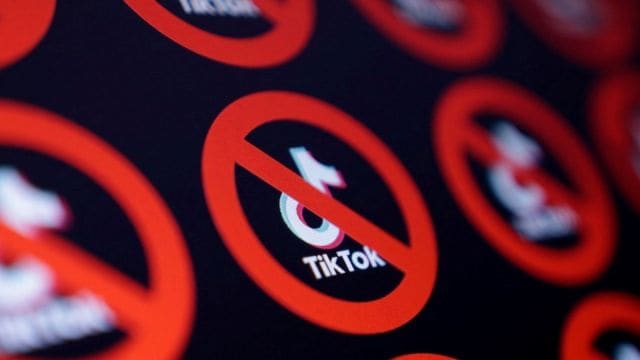
Earlier, the U.S. Supreme Court unanimously upheld a federal law banning TikTok amid ongoing concerns about the Chinese government’s potential access to American users’ personal information.
Story continues below this ad
 TikTok said it shut down the platform late Saturday because of a federal law that required parent company ByteDance to sell its U.S. operation by Sunday. (AP Photo)
TikTok said it shut down the platform late Saturday because of a federal law that required parent company ByteDance to sell its U.S. operation by Sunday. (AP Photo)
In response to these allegations, TikTok has consistently denied any claims of government influence, asserting that it does not share U.S. user data with Chinese authorities and emphasizing its international funding sources.
Despite becoming one of the most widely used social media platforms globally and emerging as the seventh most valuable brand, with a brand value that surged by 26% to approximately USD 105.8 billion, as reported by Brand Finance, TikTok continues to face scrutiny over issues regarding privacy and security.
Allegations of suppressing political content have also raised questions about transparency and content moderation biases. In light of concerns surrounding its data collection practices and potential access by the Chinese government, calls for bans or restrictions have intensified.
A complete list of countries that have imposed the TikTok ban
As the debate around social media governance evolves with the app continuing to face criticism and restrictions, here are some of the countries with restrictions on TikTok.
Story continues below this ad
Source: AP
While some of these countries have implemented temporary bans due to concerns over data privacy and security, others have proposed stricter regulations to monitor content, impacting its global reach and user engagement.
Read below in detail to know the reason why countries have imposed a ban on TikTok:
Afghanistan
In 2022, TikTok, alongside the video game PUBG, was banned by the Taliban leadership, with this decision was made to protect young people from potential misinformation and misleading content.
Story continues below this ad
Australia
The Australian federal government prohibits the use of TikTok on devices issued to its employees. Attorney-General Mark Dreyfus stated that this ban was implemented following consultations with the country’s intelligence and security agencies.
Belgium
Recently, Belgium’s National Security Council announced an indefinite ban on TikTok for federal government devices. This decision followed a temporary ban introduced last year due to concerns over cybersecurity, privacy, and the dissemination of misinformation. Prime Minister Alexander de Croo emphasised that the move was guided by warnings from the state security service and the cybersecurity centre.
Canada
The Canadian federal government has disallowed TikTok on its issued devices, citing significant privacy and security risks. As a result, the app will be removed from devices, and employees will be restricted from downloading it.
China
TikTok is not accessible in mainland China, instead, ByteDance provides Chinese users with Douyin, a similar application that adheres to the strict censorship regulations of Beijing.
Story continues below this ad
Furthermore, the app also halted its operations in Hong Kong following the implementation of a comprehensive national security law.
Denmark
Denmark’s Defence Ministry has prohibited its employees from installing TikTok on their work phones, mandating the removal of the app at the earliest opportunity. The ministry cited significant security concerns and noted that there is little necessity for using the app in a professional context.
European Union
The European Parliament, European Commission, and the EU Council have collectively banned TikTok on devices used by their staff. As part of this directive, lawmakers and their teams are encouraged to remove the TikTok application from personal devices as well.
France
The French government has banned “recreational” use of TikTok and other social media applications, including Twitter and Instagram, on the phones of government employees.
Story continues below this ad
This decision was influenced by concerns over inadequate data security measures, reflecting similar actions taken by other governments against TikTok.
India
In 2020, India enacted a nationwide ban on TikTok and several other Chinese applications, including messaging platform WeChat, in response to privacy and security issues.
Indonesia
While TikTok is not fully banned in Indonesia, its online retail functionality has been restricted due to recent government regulations aimed at curbing e-commerce transactions conducted via social media platforms. This measure was implemented to safeguard small businesses.
Latvia
Latvian Foreign Minister Edgars Rinkevics publicly announced the deletion of his TikTok account and confirmed that the app is prohibited on official smartphones within the foreign ministry.
Story continues below this ad
Netherlands
The Dutch central government has imposed a ban on several applications, including TikTok, on employee work devices due to concerns related to data security. Although TikTok was not specifically mentioned, the government advised civil servants against using apps from countries perceived to have aggressive cyber agendas against the Netherlands.
Nepal
In Nepal, authorities have enacted a nationwide ban on TikTok, citing its role in disrupting “social harmony” and circulating inappropriate content. Telecom companies have been instructed to block access to the app.
New Zealand
In New Zealand, TikTok has been banned from the devices of lawmakers and parliamentary staff, following recommendations from government cybersecurity experts. The app has been removed from all devices connected to the parliamentary network, though officials may make special provisions for individuals needing access for their official duties.
Norway
The Norwegian parliament has prohibited the use of TikTok on work devices after a warning from the Justice Ministry that the app should not be installed on government-issued phones. The parliament’s speaker emphasised the urgent need to remove TikTok from devices accessing parliamentary systems, with additional recommendations for municipal employees in Oslo and Bergen to uninstall the app.
Story continues below this ad
Pakistan
Since 2020, Pakistani authorities have temporarily banned TikTok on several occasions, attributing these interventions to concerns about the app promoting inappropriate content.
Somalia
The Somali government has instructed telecom providers to block access to TikTok, along with the messaging platform Telegram and the gambling site 1XBET. Officials expressed worries that these platforms could facilitate the spread of extremist content, obscene images, and other material deemed offensive to Somali values.
Taiwan
Taiwan has implemented a ban on the use of TikTok on public sector devices following warnings from the FBI regarding potential national security threats. Chinese-made software, including TikTok, its counterpart Douyin, and the Chinese lifestyle app Xiaohongshu, is prohibited on government-issued devices such as mobile phones, tablets, and desktop computers.
United Kingdom
UK government ministers and civil servants are banned from using TikTok on their mobile phones, as a precautionary measure for security. The British Parliament and other entities including the semi-autonomous Scottish government and London City Hall have also implemented similar bans.



 TikTok said it shut down the platform late Saturday because of a federal law that required parent company ByteDance to sell its U.S. operation by Sunday. (AP Photo)
TikTok said it shut down the platform late Saturday because of a federal law that required parent company ByteDance to sell its U.S. operation by Sunday. (AP Photo)





























